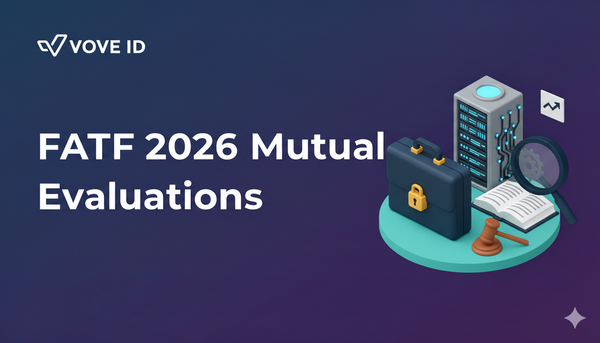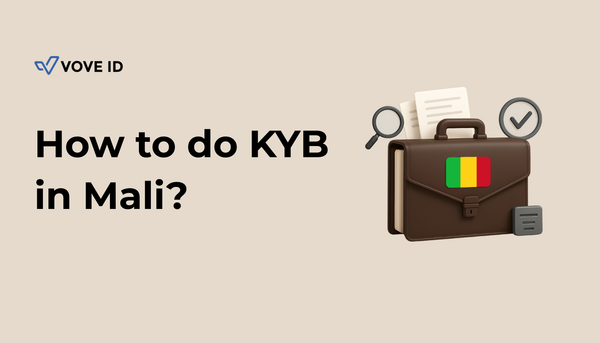AML in Crypto: 2025 Guide for Startups in MENA and Africa
Discover how crypto startups in MENA and Africa can master AML compliance in 2025. Explore key regulations, risks, AI trends, and practical strategies for building trust.

Anti-Money Laundering (AML) is no longer a back-office checkbox for crypto businesses. In 2025, it’s a defining factor in whether exchanges, wallets, and DeFi platforms can scale, attract investors, and maintain banking relationships. For founders in MENA and Africa, where regulations evolve rapidly and enforcement is tightening, a robust AML framework is both survival and growth strategy.
If you’re running a crypto wallet in Lagos or a trading platform in Dubai, the question isn’t whether regulators will come knocking — it’s whether your systems can prove compliance when they do. This is where solutions like VOVE ID give startups the infrastructure to handle KYC, KYB, and AML from day one, aligning with both local and global expectations.
Why AML Matters in Crypto
Crypto remains attractive to illicit actors because of its global reach and pseudo-anonymity. Regulators are concerned about:
- Mixers and tumblers, which obscure transaction trails.
- DeFi protocols, often operating without central oversight.
- Sanctions evasion, particularly through stablecoins.
- Emerging risks such as ransomware payments and NFT-based laundering, where inflated digital assets are traded to disguise illicit funds.
For startups, failure to detect and report such activity can result in frozen accounts, loss of licenses, or reputational collapse.
Key Regulatory Frameworks
Crypto AML rules vary by region, but three frameworks dominate the landscape:
- MiCA (EU): Requires virtual asset service providers (VASPs) to meet strict transparency, licensing, and reporting rules. A Nigerian exchange onboarding EU clients must account for MiCA’s obligations; compliance now stretches beyond borders.
- FinCEN (US): Enforces the Travel Rule, demanding that sender and recipient details accompany transfers over $3,000.
- VARA (UAE): Sets licensing standards for exchanges and enforces ongoing AML obligations.
In Africa, enforcement varies. Nigeria’s SEC and the NFIU demand AML programs from crypto firms. Kenya’s CBK and Financial Reporting Centre are gradually tightening oversight. Ghana and Côte d’Ivoire have AML rules on paper but limited enforcement capacity, creating ambiguity.
Practical Challenges for Startups
1. Navigating Regulatory Gaps
Picture this: your startup is incorporated in Accra, onboarding users across West Africa. Ghana’s FIU has unclear reporting formats, Côte d’Ivoire’s enforcement is inconsistent, and Nigeria is far stricter. How do you navigate? The answer is consistency: apply the highest standard across all operations.
2. Vendor Oversight
Many founders plug in third-party compliance tools without asking tough questions. But if your vendor fails to update sanctions lists or doesn’t comply with the Travel Rule, your startup is still liable. Auditing vendor AML policies and ensuring they meet your jurisdictions’ standards is non-negotiable.
3. Data Gaps
In regions with limited ID coverage, onboarding requires flexible KYC options: biometric checks, mobile money records, or government eKYC systems where available. Providers like VOVE ID specialize in adapting to these realities, ensuring AML doesn’t stall user growth.
How AML Tech Works in Crypto
AML is only as strong as the technology behind it. Here’s how startups deploy tools in practice:
- Blockchain analytics: Clustering wallets to identify related addresses, flagging abnormal transaction velocity, and scoring exposure to mixers or darknet markets.
- Risk scoring: Assigning “low, medium, high” risk levels to users and transactions. For example, a user transacting small amounts locally may be low risk, while repeated transfers through high-risk jurisdictions raise a high-risk flag.
- Ongoing monitoring: Detecting suspicious activity patterns over time, such as sudden spikes in volume or repeated attempts to interact with sanctioned entities.
Machine learning is becoming crucial here. By learning user patterns, AI reduces false positives, allowing compliance teams to focus on real risks rather than chasing noise.
Regional Snapshot: AML Rules at a Glance
| Country/Region | Regulator(s) | AML Requirements for Crypto |
|---|---|---|
| UAE | VARA, CBUAE | Licensing, Travel Rule, ongoing monitoring |
| Nigeria | SEC, NFIU | AML program, suspicious transaction reports, Travel Rule |
| Kenya | CBK, FRC | Licensing, reporting obligations (expanding) |
| Ghana | FIC | AML rules exist, enforcement weak |
| Côte d’Ivoire | BCEAO, CENTIF | Rules aligned with WAEMU, limited enforcement |
Checklist: AML Essentials for Crypto Startups
- ✅ Customer Due Diligence (KYC/eKYC at onboarding)
- ✅ Ongoing monitoring with blockchain analytics
- ✅ Suspicious activity reporting (SARs/STRs)
- ✅ Vendor due diligence and audits
- ✅ Compliance training for staff
The Road Ahead: AI, CBDCs, and Beyond
AML in crypto isn’t static. Two forces are reshaping the future:
- AI: Beyond reducing false positives, AI can detect subtle typologies, like layering funds across multiple DeFi protocols. Startups that integrate AI early will operate leaner compliance teams with sharper insights.
- CBDCs: Central bank digital currencies in Nigeria and the UAE bring fiat-like oversight into crypto rails. This will likely mean stricter KYC at the point of CBDC integration, raising the bar for startups to build flexible onboarding systems.
Startups that anticipate these trends will be better positioned to pivot with regulators rather than scramble after rules are issued.
Why AML Is a Competitive Advantage
AML isn’t just about avoiding fines. It signals credibility to banks, investors, and users. A founder who can say, “Our AML is aligned with FATF and MiCA standards” has a competitive edge in fundraising and partnerships.
Conclusion: Next Steps for Founders
If you’re building in crypto today, AML is not optional — it’s strategic. Don’t wait for regulators to dictate your roadmap. Instead:
- Audit your AML program this quarter.
- Map the regulators you’ll face in the next 12 months.
- Engage vendors you can trust, and verify their compliance, not just their marketing.
- Treat AML as a growth enabler, not a burden.
In the fast-moving world of crypto, compliance is credibility. For startups in Africa and MENA, getting AML right from the beginning is the surest way to build trust, attract investment, and outpace competitors.
Ensure real-time sanctions screening, effective monitoring, and compliant reporting. VOVE ID helps startups implement eKYC and AML checks quickly, so you can scale confidently across MENA and Africa.




